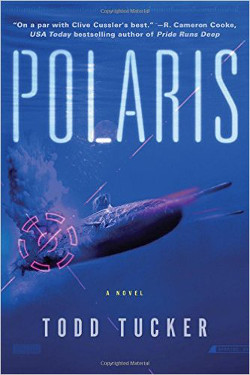 Polaris by Todd Tucker is a submarine-based military thriller and a riveting tale of warfare in the not-too-distant future (Available June 14, 2016).
Polaris by Todd Tucker is a submarine-based military thriller and a riveting tale of warfare in the not-too-distant future (Available June 14, 2016).
Like a sleek dark shape in the watery depths which is the Polaris submarine—a killing machine in everything but name—this book creeps up on you and grabs you from behind. No gentle tap on the shoulder for the reader of Todd Tucker’s sharp, tight thriller.
Mr. Tucker has served aboard submarines, and it shows in his storytelling. A common tendency on the part of writers who have experienced specific life events is to work them into every single part of the storytelling. It is wearisome and creates a piece of work which is more like a technical manual—though lacking in the total accuracy one demands of something which is serving to inform and educate. This book is no exception but the author gets away with it, smartly, as the setting—a nuclear submarine—is, in itself, claustrophobic, repetitive, and all consuming. The lack of accuracy doesn’t matter, as it is set in the future. Imagination takes over when it comes to things which are still to pass. “On May 29, 2029, operational control of the USS Polaris was given to the Alliance, to aid their mission of supporting democracy around the world”
I boarded a submarine once and only once. I lasted eleven seconds before I had to leave, very quickly. I decided, then, I would rather have my spleen dragged out by a tractor than ever set foot in one of those things again. Not for me.
I did, however, allow myself to be taken on this particular journey, and it is the nearest I will allow myself to be near any kind of submarine.
Pete Hamlin is on board the submarine Polaris, but he is not sure where it is taking him or what his role is supposed to be. He is suffering memory loss, which means he cannot be certain whether anything being presented to him is actually the truth.
The Commanding Officer, Captain McCallister, is not in command of the submarine, by any means, and according to a woman with oak leaves embroidered on her collar and a nametag which reads Moody, he is not be trusted or obeyed. She stuns the unfortunate McCallister with a Taser for good measure, just in case the point is lost on Hamlin, who is reluctant to let her know just how little he remembers.
He’s not sure how he sustained the injury on his forehead, but he does think he remembers his wife and what has happened to her. However, the memory—if accurate—is too painful to accept.
While on a mission, The Polaris is being hunted by futuristic drones and another killer submarine. The few remaining people still alive on the Polaris have to work out what to do, when to do it, and how to do it—to keep themselves alive and somehow make a meaningful contribution to the worldwide crisis of an epidemic, which is doing a pretty good job of seriously depleting the planet of humans. Close your eyes and you could be there:
Two miles away, on the Typhon submarine, Commander Jennifer Carlson listened to the recording from the sonar. Her second-in-command,Lieutenant Banach, stood next to her. She pushed a button, and listened again.
“Any ideas?” she asked Banach.
He shrugged. “It’s loud.” He spoke with the thick accent of his native province, and he’d learned to speak in short direct sentences to avoid confusion. Carlson was the purest killer Typhon had, in any branch of the military. On the first day of the war, three long years earlier, she’d sunk two Alliance warships in the South China Sea: a guided missile cruiser, and a destroyer that was sent to destroy her. Afterward, she’d steamed among the wreckage, taking photographs through the scope, looking at what they’d done with their two torpedoes, and acquired a taste for killing that had never been sated. She didn’t believe in politics, diplomacy, or anything that Military Intelligence told her. She wasn’t even all that fond of nuclear power, which kept her highly engineered killing machine moving through the water. She believed only in torpedoes, missiles, and, when things got really tight, bullets. She believed in angles of attack, ranges, and keeping her baffles clear. Because she was pure, the crew adored her.
Not all the action takes place six hundred feet below the surface of the dark, unsettled water. About half way through the book, everything moves to a nearby island, and the story, for me, does not suffer for it. The drones get a good outing, and the stuff of the future is not left behind.
Hamlin shrugged. “We’re not sure. We’ve had one in the air, circling Detroit, for eighteen months now, and it shows no sign of wearing out. And they can land and recharge-rest, so to speak. The design life is five years but we’re pretty sure they can last longer than that.
“And they use infrared?”
“Multispectral targeting. Infrared and visible imager. That’s in the nose. Along the underside of the wings are the MAD units.”
Polaris is a good read, a sharp yarn with plenty in there for everyone—even those who are not too keen on submarines. I also learned that there is plenty more to do on a submarine than just fiddle with knobs.
Read an excerpt of Polaris here!
To learn more or order a copy, visit:
Dirk Robertson is a Scots thriller writer, currently in Virginia where he is promoting literacy and art projects for young gang members. When not writing, tweeting, or blogging on the Mystery Writers of America website, he designs and knits clothes and handbags from recycled rubbish.
